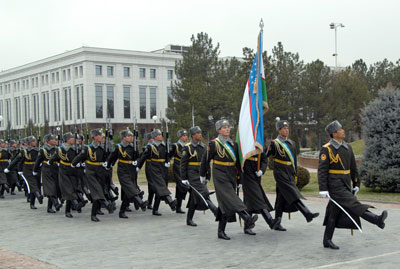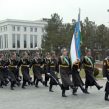
New Foreign Policy Strategy Paper Codifies Uzbekistan’s Reluctance Toward Restrictive Alliances
Publication: Eurasia Daily Monitor Volume: 9 Issue: 153
By:

On August 1, the Lower Chamber of Uzbekistan’s Parliament – the Oliy Majlis – approved the country’s own national security strategy, “The Concept Paper on the Foreign Policy Activity of Uzbekistan.” One of the essential elements in this articulated strategy is the position not to take part in any politico-military blocs (News.olam.uz, Mir24.tv, August 1). In light of Tashkent’s earlier decision to suspend its membership in the Collective Security Treaty Organization (CSTO) (see EDM, July 11, 18), Uzbekistan is sending a clear signal to the parties concerned that it is not going to restrict itself to an alignment with any single great power. It may also underline Tashkent’s long-term desire to eventually assume a regional leadership role in Central Asia.
The national security strategy document further elucidates Uzbekistan’s ultimate right to seek membership in any international organization of its choosing and to leave if it turns into a military one. In addition, the Concept Paper articulates Uzbekistan’s ban on foreign military bases on its territory, as well as the country’s non-participation in peacekeeping operations abroad. The document declares that regional or bilateral integration projects cannot be imposed on Uzbekistan externally and should not infringe on the freedom, independence and territorial integrity of the country. The problems inherent to Central Asia should be resolved by the regional countries themselves, without interference from external powers. The Concept Paper explains that these rules will help to strengthen the sovereignty of Uzbekistan and create security, stability, as well as an amicable neighborhood along its borders (Anons.uz, July 31, August 1).
A number of international and regional outlets have alleged that the Concept Paper was Uzbekistan’s first formulation of its national security strategy (Ferghananews.org, RIA Novosti, August 1). In fact it is not. The country’s non-bloc status and its pledge to withdraw from any international organization that becomes a military one have been enshrined in law decades ago. Specifically, Article 6 of the Law on the Main Principles of Foreign Policy Priorities of Uzbekistan adopted on December 26, 1996, and Article 4 of the Law on Defense adopted on July 3, 1992, laid out these priorities (Lex.uz).
A cardinal new change in the paper, however, is Tashkent’s reluctance to participate in peacekeeping operations abroad (Pordobno.uz, August 1). Such a restriction had not been articulated before, and Uzbekistan’s Armed Forces were explicitly allowed to take part in peacekeeping missions under the aegis of the United Nations and within NATO’s Partnership for Peace program, according to Chapter III of its Military Doctrine adopted in 1995 (Lex.uz). Uzbek society was utterly discontented with the growing death toll of their republic’s citizens fighting during the Afghan War in the 1980s, as well as the hazing experienced by Uzbeks serving in the Soviet Union’s army in the 1990s. These memories are still fresh in the minds of Uzbek society, and help illustrate the foreign policy direction being charted under President Islam Karimov’s leadership. The national security strategy articulated in the Concept Paper is thus a logical extension of Karimov’s statecraft, and determines the fundamental principles and strategic priorities of the nation in the international arena.
“The Concept Paper on the Foreign Policy Activity of Uzbekistan” has multidimensional significance and is directed at various international, regional and domestic audiences. First, it is clearly aimed at calming down the burning concerns of Russia. As Uzbekistan backed away from the Moscow-led CSTO in June, there had been much speculation in the top echelons of the Kremlin regarding the real motives behind Tashkent’s actions (RIA Novosti, June 30). At the same time, Uzbekistan takes the threat of militarization of the volatile region of Central Asia very seriously. For instance, in Uzbekistan’s view, Manas, Kyrgyzstan, where both the United States and Russia have their bases within several kilometers of each other, did not avert the country from succumbing to social upheavals and turmoil in 2010.
The strategy paper is also, in part, aimed at the United States. Annual bilateral consultations (ABCs) on security matters will soon be held with Washington in Tashkent. Therefore, Uzbekistan is setting the scene for the upcoming negotiations, and discussions of permanent basing rights for US forces may prove futile. Having hosted US forces on its territory before, Tashkent feels that it did not entirely benefit from standing together with Washington. Consequently, it is unlikely to easily accede to US wishes on future basing rights again.
The newly-adopted national security strategy also reflects Uzbekistan’s urgent need to diversify its trade, economic, IT, transport and other international exchanges. At this point in its economic progress, Uzbekistan needs not military bases but investments, know how and access to advanced technologies to ensure sustainable development. By proclaiming its peaceful policy, Uzbekistan shows it prioritizes secure, long-term and sustainable, socio-economic development, as well as unwavering political stability for years to come. The Concept Paper did not leave unmentioned issues of hydroelectric power, which play a central role in Tashkent’s overall foreign policy, especially regionally. It stresses that Uzbekistan holds a principled position on the use of trans-border rivers and that any water-related disputes should be solved exclusively at a bilateral level, taking into account international legal instruments. Uzbekistan notes that there is a lack of a common stand among Central Asian countries regarding water as a result of certain states’ – implying Tajikistan – refutation of international legal norms (Lenta.ru, Uzinform.uz, August 1). This latter point demonstrates Tashkent’s readiness to argue its position against Dushanbe within both bilateral and multilateral forums.
Finally, the Concept Paper expresses Uzbekistan’s intent to further strengthen its role within international relations. Though recognizing the ongoing “scramble” for Central Asia by outside powers, Uzbekistan under no circumstances wishes to become the object (read “pawn”) of the policies of great and regional powers. By assuming military neutrality, Tashkent believes it will be able to more easily pursue its policy of regional preponderance in Central Asia, while being able to deal with all other countries on a purely case-by-case, differentiated and bilateral basis without losing its military “vigilance.” This very thinking explains how Uzbekistan views its role and place in the region and the world. Tashkent trusts that its national security strategy will allow it a wide-enough field of maneuver to pursue multi-vector diplomacy among the major poles of global power. Had Uzbekistan joined the CSTO’s Rapid Reaction Force, it would have fallen unquestionably under Russia’s sphere of influence; if it opened the door to a new US base on its territory, Tashkent would be implicitly positioning itself in opposition to China, Russia and Iran, thus restricting its prospective trade, economic and other relations with them.
The foreign policy behavior of Uzbekistan reflects the country’s firm stand in safeguarding its sovereignty that may at times clearly recall the principles of the Non-Aligned Movement, heralded by China, India, Indonesia and others, whose non-aligned posture saved them from being involved in individual ideological camps and proxy wars during the Cold War. Tashkent is fully conscious that the fortification of one’s own security may lead to a proportional military build-up of a competitor, and thus it acts specifically to prevent the initiation of an arms race in Central Asia.




